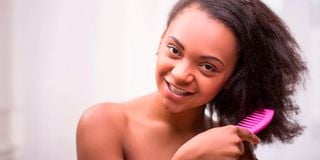7 proven tips for healthier, longer and beautiful hair

Hair serves as both an aesthetic and as protection against the sun's rays and extreme cold.
What you need to know:
- Natural hair regrowth can be challenging, especially when it starts thinning.
- There are many natural ingredients and practices you can do to stimulate new growth.
- These tips for regrowing your hair are based on the idea of providing nutrients, moisture, and protecting your strands.
Are you one of those people who blame their genes when they experience hair loss and believe there is nothing they can do about it? The truth is, hair loss can be caused by several other factors which means there are also different solutions to the problem.
Some people swear by apple cider vinegar, while others say horsetail or nettle tea works best for their hair loss problems. If you are looking for an all-natural solution, aloe Vera gel might be your answer. The point is, there are tons of natural remedies that you can try.
The first step is understanding your role in your hair loss problem. Once you know how your habits contribute to thinning locks or bald spots, finding a solution becomes easier.
- Manage your stress levels
Stress can cause your body to go into overdrive, putting it in a state of constant fight-or-flight. This is bad for your hair follicles because blood flow decreases when you are under stress.
One way to help reduce stress is by meditating or practicing deep breathing exercises. Try getting more sleep as well because hormones related to stress can be produced when you do not get enough sleep.
- Massage the scalp
Massaging the scalp stimulates blood flow to the hair follicles, which can strengthen existing strands and regrow thinning hairs.
Massaging your head regularly promotes hair growth by increasing circulation and relieving stress. You can add hair oil when massaging your scalp to hydrate your hair and reduce split ends.
- Nutrition
Hair is made up of protein which means you need to incorporate as many proteins into your diet as possible. Vitamin A and iron are also essential for a healthy scalp, along with omega-rich foods like salmon, walnuts, and flaxseed oil.
Biotin deficiency has been linked to thinning hair. Taking a biotin supplement might be the easiest way to introduce these nutrients into your diet. If you are not into popping pills, try getting more vitamins and minerals from your food.
- Healthy hair practices
Cutting off dead or damaged ends will not only make your hair look healthier but stimulates new growth by allowing the follicle to breathe. Trim every six weeks for maximum results.
Protective hairstyles like cornrows or natural hair twists are the safest way to protect your hair from breakage. Wearing hair in a protective style can also help prevent dandruff and dry scalp by keeping it moisturized with oils for weeks at a time.
Use heat sparingly. Hair experts say that exposing your hair to too much heat can cause split ends and breakage. Use heat protectant sprays before using hot tools.
- Use of coconut oil
Coconut oil has a high concentration of lauric acid, which enables it to travel through the hair shaft, stimulating hair growth quickly. It has been used for centuries in hair products, including shampoos and conditioners.
Coconut oil helps reduce protein loss during washing. In addition, it locks moisture in your hair so it looks shiny and feels soft. Applying a little oil to your scalp can help reduce dandruff and heal dry skin.
Coconut oil is also known for its antibacterial properties which protect against infections that could lead to hair loss or bald spots on the scalp.
- Aloe Vera
Aloe vera is known for its soothing and moisturising properties. In addition, it contains essential amino acids which help strengthen hair strands from the inside out. It also deep cleans the hair without stripping it of natural oils and leaves your hair soft and shiny. It also contains enzymes that help remove dead skin cells from the scalp.
Since it is packed with minerals like magnesium, Aloe Vera also helps balance the PH levels of your scalp to reduce dandruff or dry spots on the skin.
Aloe Vera is rich in vitamin C, an antioxidant that promotes collagen production for healthy hair and keeps the roots strong.
- Castor oil
Castor oil is a heavy moisturiser that can help stimulate hair follicles.
The ricinoleic acid in castor oil helps prevent dandruff by killing bacteria on the scalp.
Castor oil also stimulates hair growth by increasing circulation near the scalp. In addition, it helps restore thickness to thinning strands, improving the overall texture and strength of your tresses.
All you need is a little castor oil rubbed into your roots before bedtime for it to work its magic overnight! However, be sure not to use too much, or it will leave your hair feeling greasy.
Other helpful tips
Try supplements like biotin, fish oil, and flaxseed oil. Keep the scalp clean by shampooing with a gentle formula that does not contain harsh chemicals. It is advisable to stay away from alcohol-based hair products because they can dry out your strands over time.
Remember, too many products in your hair can weigh down fine hair and make thick locks look greasy. Also, do not brush your hair too often because it can cause breakage. When you brush, brush from the bottom up, starting at the nape to avoid unnecessary tugging or pulling on strands.




